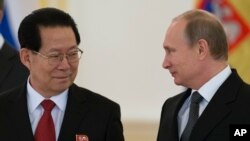North Korea is ratcheting up nuclear rhetoric to resist international pressure arising from Iran’s nuclear deal.
This week, the North mobilized its ambassadors to stress that Pyongyang is not interested in an Iran-type nuclear deal, and it will not negotiate away its nuclear weapons.
“One must say that the nuclear problem on the Korean Peninsula and the Iranian nuclear dossier are absolutely different in nature,” Kim Hyun Joon, Pyongyang’s envoy to Moscow, said in an interview with Russia’s Interfax news agency released Wednesday.
“It is well-known that the DPRK is already a nuclear state in both content and form,” the envoy added.
On Tuesday, the North Korean ambassador to China reiterated his country’s previous position on the nuclear issue.
“We are not interested at all in dialogue to discuss the issue of freezing or dismantling our nukes unilaterally first,” Ji Jae Ryong told reporters.
Standing alone
Experts see the Pyongyang's reinforcement of its nuclear rhetoric as an attempt to counter international efforts to denuclearize the communist country.
“North Korean interviews and statements are primarily pre-emptive. I believe that North Korean leaders are concerned that with Iran now reaching an agreement with the international community, Pyongyang is standing alone as a rogue nation,” David Straub, a former State Department official who dealt with North Korean affairs, said in an interview with VOA.
Evans Revere, former principal deputy assistant secretary of state, said North Koreans are trying to send a message to the international community that “they regard themselves as a nuclear weapons state and they’re not going to give up their nuclear weapons.”
More pressure
Revere said Pyongyang is likely to keep the current nuclear stance and refuse to participate in talks aimed at its denuclearization. He suggested the United States put more pressure on the North Korean leadership to change its behavior.
“My own suggestion to this administration has been that one thing North Korea holds the most dearly is the survival and preservation of its regime," he said. "And therefore, the one thing that needs to be tried is to put regime survival at risk.”
Frank Jannuzi, president of Mansfield Foundation, a U.S.-Asia policy and research group, argues that pressure alone will not make the North change course.
“There probably needs to be a combination of both more pressure but also greater communication to North Korea about how their situation could improve if they accommodate the international community’s strong, united desire that they abandon their nuclear weapons,” said Jannuzi.
Washington dispatched its envoy for the multistate nuclear talks to the region this week in a bid to press Pyongyang to return to talks.
Sydney Seiler, special envoy for the six-party talks, told reporters in Seoul that the Iranian agreement “provides an excellent example of the U.S. flexibility and willingness to engage with countries with whom we’ve had long-standing differences.”
The nuclear talks have been stalled since late 2008.
Jee Abbey Lee contributed to this report.




